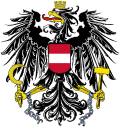| Ambassador of the Republic of Austria to South Africa | |
|---|---|
 Coat of arms of Austria | |
| Ministry of Foreign Affairs Embassy of Austria, Pretoria | |
| Style | Her Excellency |
| Website | Austrian Embassy, Pretoria |
The Ambassador of the Republic of Austria to South Africa is the Republic of Austria's foremost diplomatic representative in South Africa. As head of Austria's diplomatic mission there, the ambassador is the official representative of the president and government of Austria to the Prime Minister and the government of South Africa. The position has the rank and status of an Ambassador Extraordinary and Minister Plenipotentiary and the embassy is located in Cape Town. [1]
Contents
The embassy's area of responsibility also includes the Republic of Angola, the Republic of Botswana, the Kingdom of Lesotho, the Republic of Madagascar, the Republic of Mauritius, the Republic of Mozambique, the Republic of Namibia, the Republic of Zimbabwe, and the Kingdom of Eswatini. [2]
